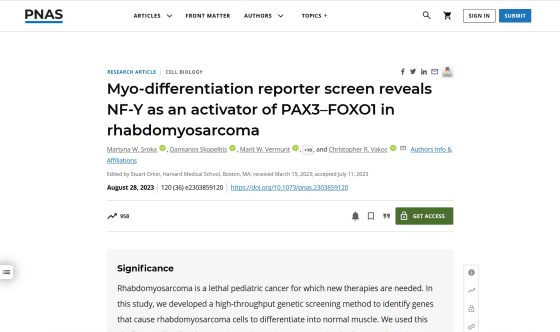Succeeded in reprogramming cancer cells into healthy cells using gene editing technology 'CRISPR'

Using CRISPR (CRISPR-Cas9) , a gene-editing technology, in an experiment to change rhabdomyosarcoma cancer cells seen in children into healthy muscle cells, Cold Spring , an American biomedical research institute ・Research teams such as the Harbor Institute have succeeded.
Myo-differentiation reporter screen reveals NF-Y as an activator of PAX3–FOXO1 in rhabdomyosarcoma | PNAS
https://www.pnas.org/doi/10.1073/pnas.2303859120

Once rhabdomyosarcoma, now muscle | Cold Spring Harbor Laboratory
https://www.cshl.edu/once-rhabdomyosarcoma-now-muscle/
CRISPR used to 'reprogram' cancer cells into healthy muscle in the lab | Live Science
https://www.livescience.com/health/cancer/crispr-used-to-reprogram-cancer-cells-into-healthy-muscle-in-the-lab
Rhabdomyosarcoma is a cancer that develops from cells that are supposed to become skeletal muscle (striated muscle) in the future, and it is said that it develops at a rate of about 4 to 5 people per million people from children to young adults. Approximately 70% of patients are children under the age of 6, and it is one of the dangerous cancers with a survival rate of less than 50% for cases considered high-risk.
In order to develop a treatment for such rhabdomyosarcoma, the research team of Professor Christopher Vachock, a molecular biologist at the Cold Spring Harbor Laboratory, reprograms cancer cells into healthy cells ' differentiation therapy We researched a treatment method called ` `(differentiation therapy) ''. Differentiation therapy is a method of treating cancer by using drugs to mature immature cancer cells and differentiate them into healthy cells.
Differentiation therapy has already been tested in bone cancer , blood cancer, etc., and the US Food and Drug Administration (FDA) has approved four types of drugs for the differentiation treatment of leukemia. These drugs generally work by inhibiting specific proteins within cancer cells.

Differentiation is the process by which stem cells change into muscle cells,
So Vacok's research team used CRISPR to disable various genes and investigate which genes work with PAX3-FOXO1 to produce proteins that stop cell differentiation. The researchers found that when rhabdomyosarcoma cells lose the ability to make a protein called NF-Y , which regulates gene expression, the cancer cells differentiate into muscle cells.
'The cells literally turn into muscles, and the tumor loses all its attributes as a cancer,' Vacok said in a statement. 'It has been switched to,' he commented.
Note that inactivating PAX3-FOXO1 and NF-Y without gene editing has a similar effect, but these proteins do not physically interact, but rather that NF-Y interacts with a specific By binding to the DNA sequence, it turns on the gene that creates PAX3-FOXO1. Therefore, the research team reports that simply blocking the gene that makes NF-Y can also block the production of PAX3-FOXO1.

Various issues need to be resolved before the results of this research can actually be applied to the treatment of rhabdomyosarcoma. One hurdle to overcome is that NF-Y is also involved in healthy cellular processes such as metabolism and the cell cycle. However, rhabdomyosarcoma cells are so sensitive to changes in PAX3-FOXO1 expression that 'treatment' may be sufficient for cancer cells to differentiate into muscle cells, but not long enough to damage healthy tissue. The research team believes that there is an 'optimal period for this.'
'With this technology (gene editing technology using CRISPR), we can take any cancer cell and look for ways to differentiate it,' Vacok said. This may be an important step toward making it easier.'
Related Posts:
in Science, Posted by log1h_ik







